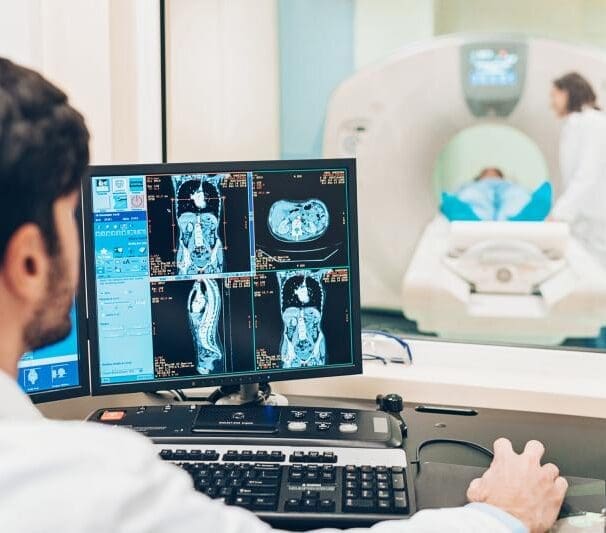HealthProviders DB is a comprehensive database of healthcare providers, including a complete directory of all Nuclear Radiology Physicians.
Radiology Healthcare Taxonomy Code 2085N0904X
As of today, the following are the total number of Nuclear Radiology Physicians nationally, in your State, and near your location.
Select a State below to view the list by State. Additionally, you can narrow the list by city, among other options, from the Filter Panel, which you can open by clicking the vertical ellipses ⋮ in the upper right corner of the app.
Alaska – Alabama – Armed Forces Pacific – Arkansas – American Samoa – Arizona – California – Colorado – Connecticut – District of Columbia – Delaware – Florida – Federated States of Micronesia – Georgia – Guam – Hawaii – Iowa – Idaho – Illinois – Indiana – Kansas – Kentucky – Louisiana – Massachusetts – Maryland – Maine – Marshall Islands – Michigan – Minnesota – Missouri – Northern Mariana Islands – Mississippi – Montana – North Carolina – North Dakota – Nebraska – New Hampshire – New Jersey – New Mexico – Nevada – New York – Ohio – Oklahoma – Oregon – Pennsylvania – Puerto Rico – Palau – Rhode Island – South Carolina – South Dakota – Tennessee – Texas – Utah – Virginia – Virgin Islands – Vermont – Washington – Wisconsin – West Virginia – Wyoming
Medicare
The following are the total number of Nuclear Radiology Physicians who accept Medicare in your State, the number who have opted out of Medicare, and the total number excluded from participation in Medicare nationwide.
The diagram below shows all the Nuclear Radiology Physicians across the country, represented by blue bubbles. The larger the bubble, the greater the concentration of providers in that area. Red bubbles represent Medicare-excluded providers, with the larger bubbles indicating a higher percentage of excluded providers in that region. You can change the bubble size to be based on exclusions from the Size menu.
What do Nuclear Radiology Physicians do?
Nuclear Radiology Physicians, also known as Nuclear Medicine Physicians, use small amounts of radioactive materials (radionuclides) to diagnose and treat diseases by producing images of organs and tissues or delivering therapeutic radiation.
They perform diagnostic procedures like PET and SPECT scans to detect issues like cancer or heart disease and administer therapeutic radionuclides for conditions such as thyroid disorders or certain cancers.
Their work involves interpreting specialized images and providing crucial information to other medical specialists to improve patient management and outcomes.
What they do
Consultation: They serve as consultants to other physicians, providing their expertise on nuclear medicine techniques.
Interpreting Data: They interpret imaging data and work with other specialists to form diagnoses.
Procedure Selection: They choose the most appropriate diagnostic or therapeutic procedures for each patient.
Quality Assurance: They ensure the quality and safety of nuclear medicine services and equipment.
Diagnostic Roles
Molecular Imaging: They use radioactive tracers to highlight cellular and organ function, revealing molecular-level information.
Scans: They use techniques such as PET (Positron Emission Tomography) and SPECT (Single Photon Emission Computed Tomography) to create detailed images of the body.
Disease Detection: These scans help detect and diagnose conditions early, including cancer, heart disease, and neurological and gastrointestinal disorders.
Assessment: They can also evaluate the effectiveness of a treatment or assess kidney function, lung conditions, and gallbladder issues.
Therapeutic Roles
Treatment Administration: They administer radionuclides to treat various conditions, such as hyperthyroidism, thyroid cancer, and certain solid tumors.
Targeted Radiation: This includes treatments like radioimmunotherapy, which delivers radiation directly to cancer cells.

